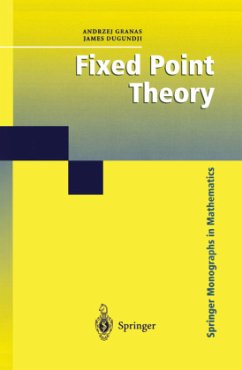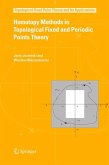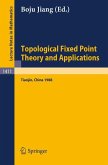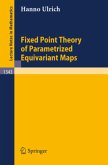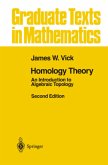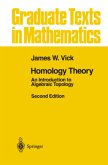The theory of Fixed Points is one of the most powerful tools of modern mathematics. This book contains a clear, detailed and well-organized presentation of the major results, together with an entertaining set of historical notes and an extensive bibliography describing further developments and applications.
From the reviews: "I recommend this excellent volume on fixed point theory to anyone interested in this core subject of nonlinear analysis." --MATHEMATICAL REVIEWS
The aim of this monograph is to give a unified account of the classical topics in fixed point theory that lie on the border-line of topology and non linear functional analysis, emphasizing developments related to the Leray Schauder theory. Using for the most part geometric methods, our study cen ters around formulating those general principles of the theory that provide the foundation for many of the modern results in diverse areas of mathe matics. The main text is self-contained for readers with a modest knowledge of topology and functional analysis; the necessary background material is collected in an appendix, or developed as needed. Only the last chapter pre supposes some familiarity with more advanced parts of algebraic topology. The "Miscellaneous Results and Examples", given in the form of exer cises, form an integral part of the book and describe further applications and extensions of the theory. Most of these additional results can be established by the methods developedin the book, and no proof in the main text relies on any of them; more demanding problems are marked by an asterisk. The "Notes and Comments" at the end of paragraphs contain references to the literature and give some further information about the results in the text.
From the reviews: "I recommend this excellent volume on fixed point theory to anyone interested in this core subject of nonlinear analysis." --MATHEMATICAL REVIEWS
The aim of this monograph is to give a unified account of the classical topics in fixed point theory that lie on the border-line of topology and non linear functional analysis, emphasizing developments related to the Leray Schauder theory. Using for the most part geometric methods, our study cen ters around formulating those general principles of the theory that provide the foundation for many of the modern results in diverse areas of mathe matics. The main text is self-contained for readers with a modest knowledge of topology and functional analysis; the necessary background material is collected in an appendix, or developed as needed. Only the last chapter pre supposes some familiarity with more advanced parts of algebraic topology. The "Miscellaneous Results and Examples", given in the form of exer cises, form an integral part of the book and describe further applications and extensions of the theory. Most of these additional results can be established by the methods developedin the book, and no proof in the main text relies on any of them; more demanding problems are marked by an asterisk. The "Notes and Comments" at the end of paragraphs contain references to the literature and give some further information about the results in the text.
From the reviews:
"Granas-Dugundji's book is an encyclopedic survey of the classical fixed point theory of continuous maps (the work of Poincaré, Brouwer, Lefschetz-Hopf, Leray-Schauder) and all its various modern extensions. This is certainly the most learned book ever likely to be published on this subject." -- Felix Browder, Rutgers University
"The theory of Fixed Points is one of the most powerful tools of modern mathematics. Not only is it used on a daily basis in pure and applied mathematics, but it also serves as a bridge between Analysis and Topology, and provides a very fruitful area of interaction between the two. This book contains a clear, detailed and well-organized presentation of the major results, together with an entertaining set of historical notes and an extensive bibliography describing further developments and applications" -- Haim Brézis, Rutgers University
"This is the most comprehensive, well-written and complete book on fixed point theory to date. The book studies just about every aspect of fixed point theory ... . The book carries an extensive literature on the subject and many examples. Many of the interesting results, given as exercises, constitute an extension of the theory established in the main text. ... I recommend this excellent volume on fixed point theory to anyone interested in this core subject of nonlinear analysis." (A.G. Kartsatos, Mathematical Reviews, 2004d)
"Thousands of papers have been published in fixed point theory and its applications ... . The book of Granas and Dugundji is a new and major contribution to this purpose. ... The main text is self-contained, the necessary background material being collected in an appendix ... . I can assert this monograph represents an exceptional event and I am sure it will become a reference work in the field. ... this book will be extremely valuable to anyone involved in fixed point theory ... ." (R. Precup, ZAA-Zeitschrift für Analysis und ihre Anwendungen, Vol. 23 (2), 2004)
"The new edition of Granas and Dugundji's book is, in my opinion, the most important and complete survey in the last years on fixed point theory ... . The main text is self-contained ... . New and interesting results and applications can be found all over the book. The style is alert and pleasant. The technical presentation of the book is exceptional. ... it will be a very useful work for anyone ... involved in fixed point theory in particular and nonlinear analysis in general." (Adrian Petrusel, Studia Universitatis Babes-Bolyai Mathematica, Vol. XLIX (1), 2004)
"This monograph gives a carefully worked-out account of the most basic principles and applications of the theory of fixed points. Until now, a treatment of many of the discussed topics has been unavailable in book form. The presentation is self-contained and is accessible to a broad spectrum of readers." (L'Enseignement Mathematique, Vol. 49 (3-4), 2003)
"Really, this book is an up-to-date and carefully worked out unified account of (not only) classical results in fixed point theory ... . The presentation is self-contained and is accessible to a broad spectrum of readers. The main text is complemented by numerous exercises, detailed comments, and a comprehensive bibliography. ... The rich bibliography comprises almost 50 pages. The book is useful to all mathematicians who deal with fixed points. It will become an obligatory volume for every serious mathematical library." (Peter Zabreiko, Zentralblatt MATH, Vol. 1025, 2003)
"This monograph provides an immense text ... on classical topics in fixed point theory that lie on the borderline of topology and nonlinear functional analysis. ... The book is well understandable and requires only a basic knowledge of topology and functional analysis ... . It can be warmly recommended to a broad spectrum of readers - to graduate students, experts and everybody who wishes to become acquainted with the basic elements and deeper properties of this part of functional analysis." (EMS Newsletter, March, 2005)
"Granas-Dugundji's book is an encyclopedic survey of the classical fixed point theory of continuous maps (the work of Poincaré, Brouwer, Lefschetz-Hopf, Leray-Schauder) and all its various modern extensions. This is certainly the most learned book ever likely to be published on this subject." -- Felix Browder, Rutgers University
"The theory of Fixed Points is one of the most powerful tools of modern mathematics. Not only is it used on a daily basis in pure and applied mathematics, but it also serves as a bridge between Analysis and Topology, and provides a very fruitful area of interaction between the two. This book contains a clear, detailed and well-organized presentation of the major results, together with an entertaining set of historical notes and an extensive bibliography describing further developments and applications" -- Haim Brézis, Rutgers University
"This is the most comprehensive, well-written and complete book on fixed point theory to date. The book studies just about every aspect of fixed point theory ... . The book carries an extensive literature on the subject and many examples. Many of the interesting results, given as exercises, constitute an extension of the theory established in the main text. ... I recommend this excellent volume on fixed point theory to anyone interested in this core subject of nonlinear analysis." (A.G. Kartsatos, Mathematical Reviews, 2004d)
"Thousands of papers have been published in fixed point theory and its applications ... . The book of Granas and Dugundji is a new and major contribution to this purpose. ... The main text is self-contained, the necessary background material being collected in an appendix ... . I can assert this monograph represents an exceptional event and I am sure it will become a reference work in the field. ... this book will be extremely valuable to anyone involved in fixed point theory ... ." (R. Precup, ZAA-Zeitschrift für Analysis und ihre Anwendungen, Vol. 23 (2), 2004)
"The new edition of Granas and Dugundji's book is, in my opinion, the most important and complete survey in the last years on fixed point theory ... . The main text is self-contained ... . New and interesting results and applications can be found all over the book. The style is alert and pleasant. The technical presentation of the book is exceptional. ... it will be a very useful work for anyone ... involved in fixed point theory in particular and nonlinear analysis in general." (Adrian Petrusel, Studia Universitatis Babes-Bolyai Mathematica, Vol. XLIX (1), 2004)
"This monograph gives a carefully worked-out account of the most basic principles and applications of the theory of fixed points. Until now, a treatment of many of the discussed topics has been unavailable in book form. The presentation is self-contained and is accessible to a broad spectrum of readers." (L'Enseignement Mathematique, Vol. 49 (3-4), 2003)
"Really, this book is an up-to-date and carefully worked out unified account of (not only) classical results in fixed point theory ... . The presentation is self-contained and is accessible to a broad spectrum of readers. The main text is complemented by numerous exercises, detailed comments, and a comprehensive bibliography. ... The rich bibliography comprises almost 50 pages. The book is useful to all mathematicians who deal with fixed points. It will become an obligatory volume for every serious mathematical library." (Peter Zabreiko, Zentralblatt MATH, Vol. 1025, 2003)
"This monograph provides an immense text ... on classical topics in fixed point theory that lie on the borderline of topology and nonlinear functional analysis. ... The book is well understandable and requires only a basic knowledge of topology and functional analysis ... . It can be warmly recommended to a broad spectrum of readers - to graduate students, experts and everybody who wishes to become acquainted with the basic elements and deeper properties of this part of functional analysis." (EMS Newsletter, March, 2005)

